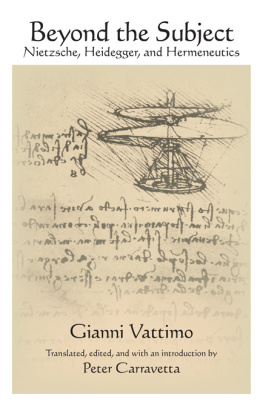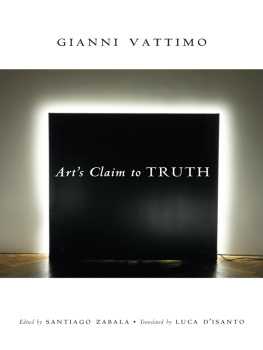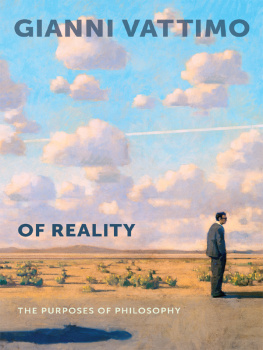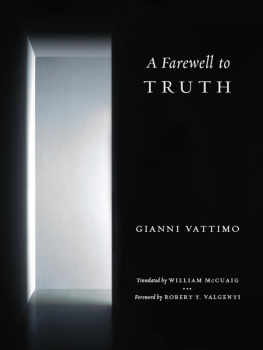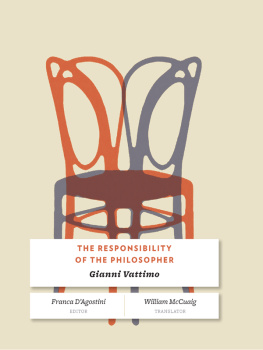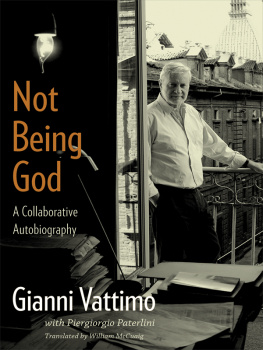Gianni Vattimo - Beyond the Subject
Here you can read online Gianni Vattimo - Beyond the Subject full text of the book (entire story) in english for free. Download pdf and epub, get meaning, cover and reviews about this ebook. year: 2019, publisher: State University of New York Press, genre: Religion. Description of the work, (preface) as well as reviews are available. Best literature library LitArk.com created for fans of good reading and offers a wide selection of genres:
Romance novel
Science fiction
Adventure
Detective
Science
History
Home and family
Prose
Art
Politics
Computer
Non-fiction
Religion
Business
Children
Humor
Choose a favorite category and find really read worthwhile books. Enjoy immersion in the world of imagination, feel the emotions of the characters or learn something new for yourself, make an fascinating discovery.
- Book:Beyond the Subject
- Author:
- Publisher:State University of New York Press
- Genre:
- Year:2019
- Rating:5 / 5
- Favourites:Add to favourites
- Your mark:
- 100
- 1
- 2
- 3
- 4
- 5
Beyond the Subject: summary, description and annotation
We offer to read an annotation, description, summary or preface (depends on what the author of the book "Beyond the Subject" wrote himself). If you haven't found the necessary information about the book — write in the comments, we will try to find it.
Beyond the Subject — read online for free the complete book (whole text) full work
Below is the text of the book, divided by pages. System saving the place of the last page read, allows you to conveniently read the book "Beyond the Subject" online for free, without having to search again every time where you left off. Put a bookmark, and you can go to the page where you finished reading at any time.
Font size:
Interval:
Bookmark:

Beyond the Subject
SUNY series in Contemporary Italian Philosophy
Silvia Benso and Brian Schroeder, editors
Beyond the Subject
Nietzsche, Heidegger, and Hermeneutics
Gianni Vattimo
Translated, edited, and with an introduction by
Peter Carravetta

Original Italian edition: Al di l del soggetto: Nietzsche, Heidegger e lermeneutica (Milan: Feltrinelli, 1981)
Published by State University of New York Press, Albany
2019 State University of New York
All rights reserved
Printed in the United States of America
No part of this book may be used or reproduced in any manner whatsoever without written permission. No part of this book may be stored in a retrieval system or transmitted in any form or by any means including electronic, electrostatic, magnetic tape, mechanical, photocopying, recording, or otherwise without the prior permission in writing of the publisher.
For information, contact State University of New York Press, Albany, NY
www.sunypress.edu
Library of Congress Cataloging-in-Publication Data
Names: Vattimo, Gianni, 1936 author.
Title: Beyond the subject : Nietzsche, Heidegger, and hermeneutics / Gianni Vattimo : translated, edited, and with an introduction by Peter Carravetta.
Other titles: Al di l del soggetto. English
Description: Albany : State University of New York, 2019. | Series: SUNY series in contemporary Italian philosophy | Includes bibliographical references and index.
Identifiers: LCCN 2018021845 | ISBN 9781438473819 (hardcover : alk. paper) | ISBN 9781438473833 (ebook)
Subjects: LCSH: Nietzsche, Friedrich Wilhelm, 18441900. | Heidegger, Martin, 18891976.
Classification: LCC B3317 .V35913 2019 | DDC 193dc23
LC record available at https://lccn.loc.gov/2018021845
10 9 8 7 6 5 4 3 2 1
Contents
Peter Carravetta
Translators Preface
The present translation of Gianni Vattimos Al di l del soggetto literally Beyond the Subject , originally published by Feltrinelli of Milan in their series Opuscoli in January 1981was conducted on the basis of the first edition of the reissue of the book in the series Idee, in April 1984. The first draft of the translation was ready by the mid-1990s and was supposed to be published by Humanities Press in a series directed at the time by Hugh Silverman. It had been read by fellow philosophers Ron Scapp and Edith Wyschogrod. Unfortunately several factors contributed to its delay and when that venue proved to be impractical, the translation ended in the proverbial drawer. I am grateful to Silvia Benso and Brian Schroeder for accepting it to publish in the SUNY Press series Contemporary Italian Philosophy. Al di l del soggetto ( Beyond the Subject ) is a major contribution to studies of Nietzsche and Heidegger, and is a pivotal text in the development of the thought of Gianni Vattimo.
In preparing this version, I went over the earlier rendition and profited greatly by a close reading done by Silvia Benso, who insisted I stay close to the original where I had often preferred legibility or idiomaticity. Vattimo makes extensive use of German words when they refer specifically to Nietzsche and Heideggers works, and I have retained those. On the technical front, I originally had distinguished between rendering essere with Being and essere (of humans, or of enti , entities) with being, whereas now the community no longer capitalizes Heideggers key notion. Nevertheless, Vattimo distinguishes between Dasein and esserci , the Italian equivalent. When he uses Dasein it is usually with Heideggers technical vocabulary in mind, and it is left in the German. When he uses esserci he clearly is not referring to Heidegger exclusively, but to the notion in a more general sense, or his own sense, and so I have often rendered it with the old-fashioned and literal expression being-there. Italian words or expressions that are key points in Vattimos interpretation, or have a broad semantic envelope and could have been rendered in a number of ways, are often added in square brackets, insofar as some readers may want to interpret them differently than the way I did. All italics are in the original, except of course in my own Introduction. I have also rendered uomo , literally man, with human being/s. For Vattimos references to Nietzsches texts in the Colli-Montinari critical edition and translation into Italian, I tried where possible to find corresponding English or German versions.
With the series editors, and with Vattimos consent, we decided to include two papers not contained in the original Al di l del soggetto , mostly owing to the fact that they expand upon the same themes addressed throughout the book. The first, here as Appendix I, , appeared in the journal Theory, Culture & Society (London: 1988, vol. 5, nos. 23, 399408).
I would like to thank my assistant Soren Whited for his scrupulous reading and questioning of the many solutions I had adopted. A word of thanks also goes to Andrew Kenyon of SUNY Press and Jack Donner and Jenn Bennett-Genthner for the final copyediting and inevitable but crucial corrections and suggestions to improve the final product. But all translations are my own ultimately, and I take responsibility for any deviation or idiosyncrasy the reader may encounter.
Publication of this volume was made possible in part thanks to the support of the Alfonse M. DAmato Chair in Italian and Italian American Studies at Stony Brook University.
Translators Introduction
The End(s) of Subjectivity and the Hermeneutic Task
P ETER C ARRAVETTA
Limine
Man is a mode of being which accomodates that Dimension always open, never finally delimited, yet constantly traversedwhich extends from a part of himself not reflected in a cogito , to the act of thought by which he apprehends that part; and which, in the inverse direction, extends from that pure apprehension to the empirical clutter, the chaotic accumulation of contents, the whole silent horizon of what is posited in the sandy stretches of non-thought.
Michel Foucault, The Order of Things: An Archaeology of the Human Sciences
My hypothesis: The subject as multiplicity.
Friedrich Nietzsche, The Will to Power
The question of the subjectits nature, origin, sense, possibilitieshas been at the core of a great deal of critical reflection for the greater part of the past century, across a variety of disciplines, and snaking through The subject has been the great thorn on the side of idealists and materialists, utopists and cynics, atheists and skeptics. Modernity, in brief, has suffered hermeneutic contortions every time it turned its spectacles toward this key notion, or very essence, variously articulated in distinct historical contexts, beginning with the Cartesian cogito , then framed as the transcendental self, subsequently as the (ever suspicious) unconscious ego , reaching the structuralist autonomous subject, finally as the ancient figura of the thers , witness and participant to virtual theorizing. It becomes patent how the fate of the subject will readily influence the destiny of interpretation.
Gianni Vattimos work intersects and contributes to the rethinking of the subject at a point when the very possibility of the/a subject has already entered a near terminal phase, that is, when from various accounts and on the basis of utterly unprecedented political and scientific-technological developmentsthe post-World War II period basicallyit appeared that what is at stake is not so much the unity, legitimation, idealization, and foundation of the subjectwhich had occupied thinkers from the Renaissance through the nineteenth century and created strong and unshakeable paradigms for thinking tout courtbut, rather, how to deal with its manifest fragmentation, with its many delegitimizing embodiments, and with partial, incomplete or experimental versions. Moreover, the killing or overcoming or deconstruction of the notion of subject (and with it subjectivity) had been cogently explored in the influential works of Nietzsche and Heidegger.
Font size:
Interval:
Bookmark:
Similar books «Beyond the Subject»
Look at similar books to Beyond the Subject. We have selected literature similar in name and meaning in the hope of providing readers with more options to find new, interesting, not yet read works.
Discussion, reviews of the book Beyond the Subject and just readers' own opinions. Leave your comments, write what you think about the work, its meaning or the main characters. Specify what exactly you liked and what you didn't like, and why you think so.

